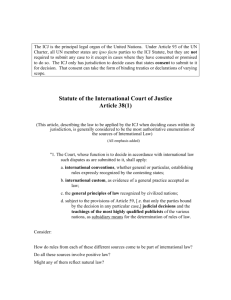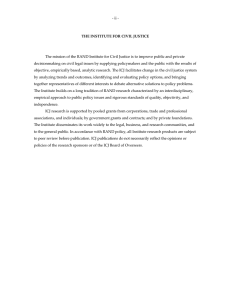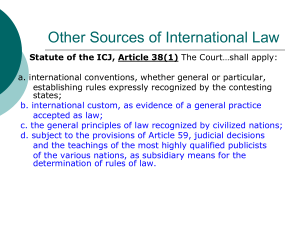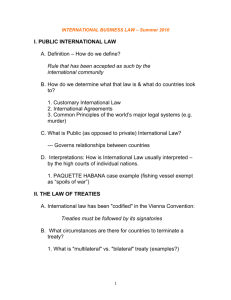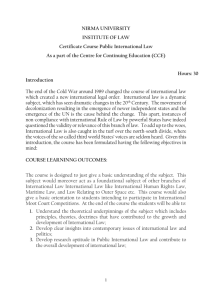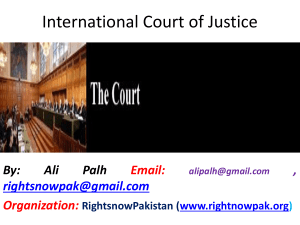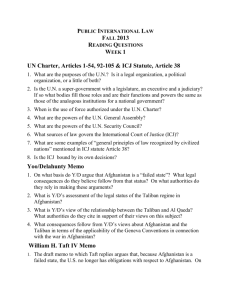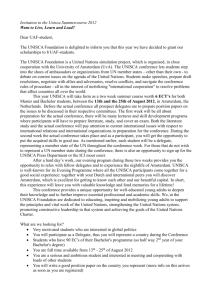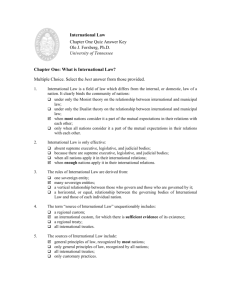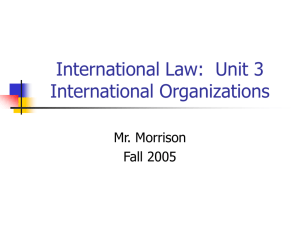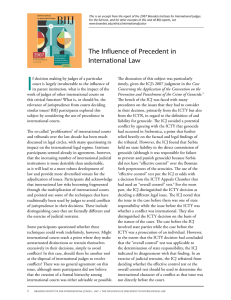sources of international law
advertisement
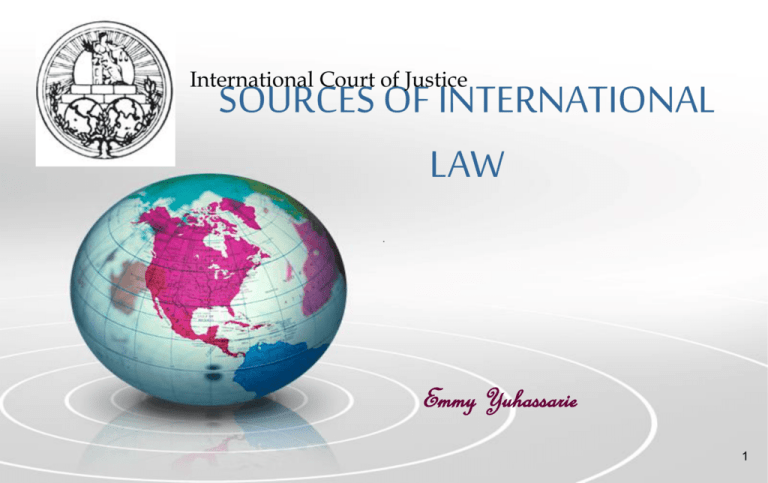
International Court of Justice SOURCES OF INTERNATIONAL LAW Emmy Yuhassarie 1 ICJ Statute and UN Charter • The Statute of ICJ is annexed to the Charter of UN, of which it forms an integral part. According to Art 92 of the Charter of UN the ICJ is the principal judicial organ of the UN. Once a State becomes a member, it automatically becomes a member if the ICJ. • The main object of the Statute is to organize the composition and the functioning of Court; WHY is Article 38 ( 1) regarded as constituting sources of international law? It is a text of the highest authority, and we may fairly assume that it expresses the duty of any tribunal which is called upon to administer international law. 2 Normative base: ICJ Statute(Art 38 Para 1) • (1) The Court, whose function is to decide in accordance with international law such disputes as are submitted to it, shall apply : a) b) c) d) International conventions, whether general or particular; International custom, as evidence of a general practice accepted as law; The general principles of law recognized by civilized nations; Judicial decisions and the teachings of the most highly qualified publicists of the various nations, as subsidiary means for the determination of rules of law ( subject to Art. 59) (2) This provision shall not prejudice the power of the Court to decide a case ex aequo et bono if the parties agree thereto. ( to the fairest judgment of the judges) 3 Are the SOURCES exhaustive ……? ARE THEY HIERARCHICAL ? • There are 2 aids: a later rule normally has preference over an earlier rule; a specific rule may derogate a general rule. The word “source” is not used in the article, Furthermore, that provision does not directly ask the IJC to treat these instruments as sources, although they are commonly referred as such. 4 • International convention. – Law making treaties or contract treaties? – Can ICJ extent the scope of application of a contractual treaty into ICJ decision and apply it other states which are not party to the said contract treaty? A treaty is obviously not equivalent to custom; it binds only the parties, and binds them only according to the enforcement provisions contained in the treaty itself . Except it becomes state practices.. But who decides that?? 5 ICJ jurisdiction according to UN Charter • According to Art 92 of the UN Charter , the ICJ is the principal judicial organ of the UN. Once a state becomes a member of that organization, it automatically becomes a member of the ICJ. Therefore, since the job of the court is to settle disputes among the UN members (which are its own members as well) it is important that the Court applies the rules of international law – as found in the sources listed in Art 3891) ICJ. • Most international tribunals had always applied international law rules to disputes between States. 6 INTERNATIONAL CUSTOM • Some times International society is considered as same as primitive society; • Rules of conduct may refer to as “usages” or “custom”. A situation in which an obligation stated in a treaty is or becomes an obligation of general customary law, in which case the non-party State maybe bound by the same substantive obligation, but as a matter of customary law, and not by the effect of the treaty VCLT Art 34; “ a treaty does not create either obligations or rights for a third State without its consent” 7 • When Europe began, in the 16th century, the earliest rules governing relations between rules should be expressed in the form of customary rules. • In particular in the event of war, problems of diplomatic relations, and competing claims in respect of the high seas. • Until the beginning of 20th century, rules of customary international law comprised the substantial part of the Law of nations. ( that’s international law previously called ) 8 The Strength basis • The base of effectiveness of International law: It is not positive law; Interdependency and state’s self interest; The common goal, that is PEACE, STABILITY and ORDER A self perpetuating quality of International law as a system of law The practitioner habit of obedience; The flexible nature 9 What are the conditions of ICL existence? • State practices; supported by what evidence? - State acts or Claims How many repetition? How long the duration? how do we say they are constant and uniform in usage ? How many states should have practiced it? How relative essential to the subject matter? • Opinio Juris sive necessitatis ( opinion as to law or necessity) : necessitated to make pre law becomes law. Or... • A shared mistake produces law ? ( communis error facit jus) 10 HOW TO EXAMINE STATE PRACTICES? and WHAT IF In A FIELD THAT THERE IS NO PRACTICE AT ALL? • Diplomatic practices • Practices of OI • Decisions of domestic courts which have impact into international relations; • State claims and state acts unilaterally . Issues of satellite ? Space exploration? Or IT development may infringe sovereignty of state 11 • Should it be documented or may just be enough by gesture? • How far should it go? It is necessary until the claim advanced as a petition in ICJ ? • CONDUCT ALONE OR WITH ASSERTIONS OR • NEED TO BE CONSISTENTLY ENFORCED 12 General Principles of Law; When Article 38 of the Statute of Permanent Court was being drafted, the commission of Jurists was concerned that in some cases the future court might find that the issues in dispute before it were not governed by any treaty, and that no established rule of customary law either could be found to determine them. It was thought undesirable, and possibly inappropriate in principle, that the Court should be obliged to declare what is known as a non liquet– a finding that there was no law on the point . What the ILC was able to agree is , failing one of those sources, the Court should apply “ the General Principle of law”. Sometimes if needed is by doing comparative studies • equity=sense of fairness, justice and reasonableness. Sometimes seen as an umbrella to general principles of law. • But equity is more value laden than is GPL 13 Judicial decisions and legal teachings( d) The 1-3 sources are more considered as formal sources, while the no 4 /d is more material source of International law; • Stare decisis; • International judicial awards: arbitration; • Settlements; • Domestic courts decisions. It is in a way may processing from lex ferenda to lex lata , just like ICL moves toward Treaty law, or from soft law to hard law. 14
